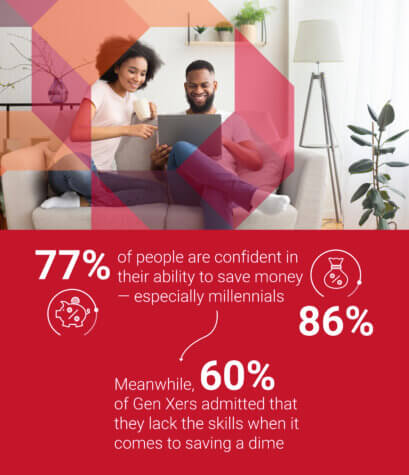
(© WavebreakMediaMicro - stock.adobe.com)
NEW YORK — More than half of Americans feel they handle their finances better than their folks. A survey of 2,000 adults looked at how different generations perceive money and finds that 58 percent believe they’re better financial managers than their parents.
Despite this, 65 percent still admit being uncomfortable when talking to them about money. This may be because 59 percent feel their parents have previously judged their financial habits. However, that isn’t stopping people from achieving their financial goals or teaching others about their hits and misses.
Almost six in 10 say they’re confident enough in their financial habits to pass them down to their children (58%).
Conducted by OnePoll on behalf of BOK Financial, the study reveals that 77 percent of people are confident in their ability to save money — especially millennials (86%). Meanwhile, 60 percent of Gen Xers admit that they lack the skills when it comes to saving a dime.
Nest egg hurdles
Saving money has been tough, though, since 58 percent of respondents have spent money more casually during the pandemic than in previous years. Two in three people agree that inflation has had a strong impact on how much money they can save, with Gen Zers expressing the most concern (83%).

As the cost of living has increased, seven in 10 respondents feel their age group has the most responsibility to make good financial decisions. Another 65 percent of all those polled feel the pressure to take care of their parents or older relatives financially.
“Inflation erodes the average person’s purchasing power but in different ways,” says Brandy Marion, institutional wealth education manager at BOK Financial, in a statement. “Baby boomers who are on a fixed budget might notice they are spending more on the same groceries as last year.”
“Gen Xers might notice that it is costing them more to drive. Gen Z and millennials are noticing that it is going to cost them more to finance a house, so they might just keep renting a bit longer,” Marion continues. “It’s not all bad news though — younger workers are more likely to see their wages rise on pace with inflation.”
It’s never too early to start saving
This financial burden particularly falls on millennials (82%) and Gen Z (80%). In fact, millennials feel the most need to be financially responsible to help look out for generations to come (78%). Millennials (54%) and boomers (31%) think making financial plans for the future in one's late 20s is enough to get by, compared to Gen Zers who are adamant about saving as early as possible (56%).
“All generations should be taking action now to become more self-sustainable,” Marion adds. “First, make a plan to pay off your debt as soon as you can and avoid accumulating future credit card debt. Next, reevaluate what is truly a needed expense versus a want. Finally, the best day to start saving for tomorrow is today. Most of us wish we had started saving sooner.”










